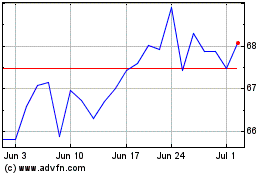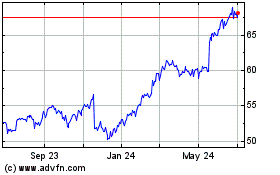By Sarah Nassauer
Wal-Mart Stores Inc. will give nearly all its U.S. hourly store
employees--and not just minimum-wage earners--a raise next month,
as the nation's largest private employer tries to combat a tighter
labor market and the turnover endemic in the retailing
industry.
Wal-Mart previously said it planned to boost its minimum wage in
February to $10 an hour. But the giant retailer said Wednesday that
hourly workers employed in its stores as of Dec. 31 would get at
least a 2% pay bump. The wage increase will affect nearly 1.2
million U.S. employees at the company's Wal-Mart and Sam's Club
stores.
The across-the-board pay increase is aimed at addressing
complaints by some longtime store workers about Wal-Mart's
more-generous starting wages for new hires. The company also is
hoping to stem defections and the sums it spends to hire and train
new employees. Wal-Mart loses about half a million store workers a
year.
Minimum-wage increases took effect in 20 states last year, and
several of the biggest employers of hourly workers, including
McDonald's Corp. and Starbucks Corp., have raised their starting
pay.
Retail workers in the U.S. earned an average of $14.95 an hour
in December, up 3.6% from a year earlier, according to the Bureau
of Labor Statistics. With the raises planned for February, average
hourly earnings will be $13.38 for Wal-Mart's full-time store
employees and $10.58 for part-time workers, the company said.
Some rivals, including Target Corp., are expected to follow
Wal-Mart's lead, especially in markets where the starting wage is
below $10 an hour. "We constantly evaluate our hourly wage rates
and adjust based on changing conditions in each market," a Target
spokesman said.
Wal-Mart is in the costly process of trying to improve its 4,600
U.S. stores while also investing heavily to boost e-commerce sales.
It has said the wage boost--including the 2% increase for those who
earn more than the minimum wage--would cost about $2.7 billion over
fiscal years 2016 and 2017, driving down next fiscal year's profit
by as much as 12%. Last week, in a rare retreat, Wal-Mart said it
would close 154 stores in the U.S. and another 115 globally, as it
weeds out weaker-performing locations.
On Wednesday, the company's shares fell 2.8% to $60.84, amid a
broad market rout. Over the past 12 months, the shares have fallen
30%.
Wal-Mart's move to broaden its pay increase shows the challenge
employers have in using wages to lure workers as unemployment rates
decline. When the retailer raised its minimum wage last April to $9
an hour, some long-term workers objected to being paid nearly the
same as a new hires with less experience, said Judith McKenna,
Wal-Mart's U.S. chief operating officer. This time Wal-Mart wanted
all employees to benefit at once and to clearly communicate the
change, she said.
Employees want to know "they will still be ahead of those who
come from an entry-level position," said Ms. McKenna, noting that
the gap between the lowest paid and more senior employees will
shrink as part of the move.
Store employees were told of the change Wednesday morning.
"At least they are recognizing that the longtime workers who are
already making more than $10 need something," said Tyfani Faulkner,
a former Wal-Mart employee and one of the leaders of OUR Walmart, a
group seeking better wages and benefits for retail workers. "I
still don't think 2% is enough," for employees that often make so
little to begin with, she said.
Wages in the U.S. rose 2.5% from a year earlier in December,
among the strongest annual gains of the current expansion. "The
labor market--now finally after 10 years--is coming into full
employment. This wouldn't be happening otherwise," said Mark Zandi,
chief economist at Moody's Analytics.
But wage growth isn't accelerating as quickly as many economists
would expect with unemployment around 5%, a level that historically
has forced employers to raise wages to grab talent. "There might be
some pressure on the retail side, but that doesn't tell me that
wage growth is breaking out," says Joseph LaVorgna, chief U.S.
economist at Deutsche Bank.
For Wal-Mart workers who make more than minimum wage, the raise
simply advances the yearly increase they would typically get on the
anniversary of their hiring date. New store employees will have to
go through six months of training before qualifying for $10 an
hour.
As part of its push to reduce turnover, the retailer is changing
other workplace policies, such managers give feed back and how
employees are promoted. New hires will be able to earn paid time
off after 90 days of employment, instead of a year or more. And
managers will increase their number of face-to-face meeting with
new employees, she said.
"One of the biggest reasons people leave...it's 'do I feel
trained to do my job, do I have feedback from supervisors and do I
feel valued?,' " said Ms. McKenna.
But turnover remains a stubborn problem. Wal-Mart's turnover
rate hasn't changed significantly in the year since it announced
its minimum-wage boost. "We always knew it would take a series of
things over a number of years to really make a difference," Ms.
McKenna said. "Wages are only part of it."
Lauren Weber and Paul Ziobro contributed to this article.
Write to Sarah Nassauer at sarah.nassauer@wsj.com
(END) Dow Jones Newswires
January 20, 2016 19:59 ET (00:59 GMT)
Copyright (c) 2016 Dow Jones & Company, Inc.
Walmart (NYSE:WMT)
Historical Stock Chart
From Mar 2024 to Apr 2024

Walmart (NYSE:WMT)
Historical Stock Chart
From Apr 2023 to Apr 2024
